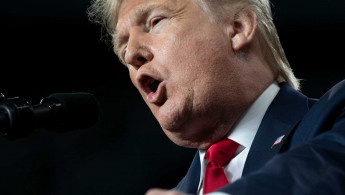'No thanks!': Trump rejects Iran's offer to negotiate if sanctions are lifted
"Iranian Foreign Minister says Iran wants to negotiate with The United States, but wants sanctions removed. @FoxNews @OANN No Thanks!" Trump tweeted in English on Saturday and later in Farsi.
Iran's Foreign Minister Mohammad Javad Zarif responded to Trump's tweet on Sunday with an excerpt from the interview reaffirming Iran's willingness to negotiate if sanctions are lifted.
"@realdonaldtrump is better advised to base his foreign policy comments & decisions on facts, rather than @FoxNews headlines or his Farsi translators," Zarif added to the tweet.
Tensions have soared between Tehran and Washington since the killing of top Iranian commander Qasem Soleimani on January 3.
Iran retaliated five days later by launching a wave of missiles at American troops stationed in Iraq, injuring more than 30 US soldiers.
On Saturday, Iran condemned what it called the "illegal and inhumane treatment" of its citizens by US border security officers after reports an Iranian student was deported despite having a valid visa.
Twitter Post
|
"Such absolutely discriminatory measures that only happen over people's race, nationality or religion are against international human rights laws and principles," foreign ministry spokesman Abbas Mousavi said.
"These individuals were questioned by America's border security over their political views and beliefs, and their social media accounts were forcefully entered," he said in a statement.
Shahab Dehghani, a 24-year-old Iranian economics student at Northwestern University, arrived in Boston with a valid student visa but was detained by US Customs and Border Patrol at Logan International Airport, US media reported on Monday.
Dehghani's case has brought attention to the treatement of Iranians at the US border as the Trump administration mulls adding several more countries to its so-called "Muslim ban".
Iran is one of seven mostly Muslim-majority countries affected by the Trump administration's travel ban, which first came into affect in early 2017.
The current iteration of the ban suspends immigrant and non-immigrant visas to applicants from the affected countries, but it allows exceptions, including for students and those who have established "significant contacts" in the US.
Washington also barred Iranian citizens from entering the US on trade and investment visas earlier this month.
"These actions against Iranians are in line with the American regime's hostile and hateful policy against Iran... now manifested in harassing Iranians at America's borders," Mousavi said on Saturday.
The spokesman warned the United States could face action "through human rights bodies", without elaborating.





 Follow the Middle East's top stories in English at The New Arab on Google News
Follow the Middle East's top stories in English at The New Arab on Google News
![The UAE is widely suspected of arming the RSF militia [Getty]](/sites/default/files/styles/image_330x185/public/2024-11/GettyImages-472529908.jpg?h=69f2b9d0&itok=Yauw3YTG)
![Netanyahu furiously denounced the ICC [Getty]](/sites/default/files/styles/image_330x185/public/2024-11/GettyImages-2169352575.jpg?h=199d8c1f&itok=-vRiruf5)
![Both Hamas and the Palestinian Authority welcomed the ICC arrest warrants [Getty]](/sites/default/files/styles/image_330x185/public/2024-11/GettyImages-2178351173.jpg?h=199d8c1f&itok=TV858iVg)